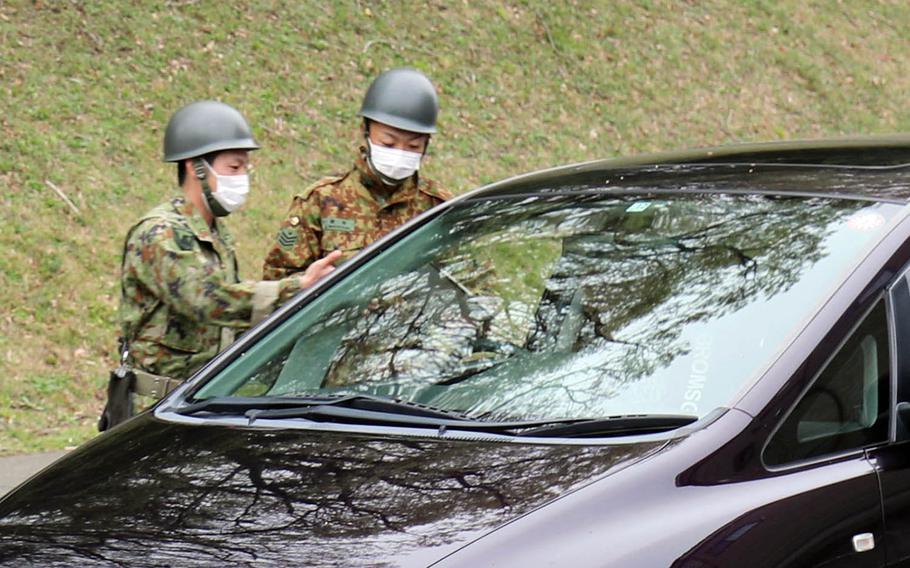
Members of the Japan Ground Self-Defense Force check a driver for coronavirus symptoms at Camp Zama, Japan, March 31, 2020. (Winifred Brown/U.S. Army)
Stars and Stripes is making stories on the coronavirus pandemic available free of charge. See other free reports here. Sign up for our daily coronavirus newsletter here. Please support our journalism with a subscription.
TOKYO – U.S. military commands in Japan have tightened their coronavirus restrictions as case numbers in Japan continue to climb and the holidays approach.
U.S. Army Japan ordered its troops to stop anything other than essential activity off its posts around Tokyo on Tuesday and banned public transportation and indoor restaurant dining.
The Air Force and Marine Corps on Okinawa this week reissued coronavirus orders that prioritize the wearing of masks. And a Defense Department school on the island again Tuesday told students in eight separate classes to remain home after someone there tested positive for the virus Monday.
The Marines reported four new coronavirus cases Wednesday at Camp Hansen, also on Okinawa. So far in December, the service has recorded 31 new patients on the island.
At Kadena Air Base, the principal of Kadena High School told students and teachers in eight classes to stay home while public health authorities await results of tests for people who had contact with a person who tested positive Monday.
Principal Kristopher Kwiatek, in a letter posted online Tuesday, said all those contacts have been identified; however, students and teachers in the eight classes are “asked to remain home until public health provides further guidance.”
Japan on Wednesday reported 1,862 new coronavirus cases, a third of them in Tokyo, according to the World Health Organization and public broadcaster NHK. The high point in Japan thus far occurred Nov. 29, the day it announced 2,585 infections.
Tokyo on Wednesday reported its second-highest daily count of new patients, 572, four days after setting its pandemic record, 584, according to public broadcaster NHK. The positivity rate, or percentage of people who test positive, is about 6%, relatively high. And more than 400 people, on average, were infected in Tokyo every day over the past week, according to metro government data.
All or parts of Tokyo are off-limits to U.S. military personnel, including civilians, except those who live there or are on official business.
From its headquarters at Camp Zama near Tokyo, U.S. Army Japan tightened restrictions on its soldiers stationed near the capital city, citing the rising number of coronavirus cases in Japan.
Service members, while not restricted to their homes or on Army installations, nonetheless are prohibited from “nonessential off-post activity,” according to a Facebook by U.S. Army Japan on Tuesday.
Troops may shop for groceries, take their children to child care, pay bills and keep medical appointments, for example, according to the post.
The order affects the Army installations near Tokyo in Kanagawa prefecture: Camp Zama, Sagami General Depot, Sagamihara Family Housing Area and Yokohama North Dock.
Civilian employees and family members are “strongly encouraged to comply” with the restrictions, according to the post. Failure to do so could mean being barred from post or having family members sent back to the United States.
The heightened restrictions are not pegged to any one development but are recommendations to U.S. Army Japan commander Maj. Gen. Viet Luong from a team that meets regularly and reviews a sweep of information, command spokesman Kevin Krejcarek told Stars and Stripes by phone Wednesday.
The restrictions are typical of a substantial risk of the coronavirus spreading, in military terms Health Protection Condition-Charlie, but the Army remains at a lower status, condition Bravo-plus, a risk slightly higher than moderate. No one is discussing a higher risk level, Krejcarek said.
The Army on Friday also extended an order prohibiting its people from visiting Yokota Air Base in western Tokyo, 26 miles north of Camp Zama, until further notice. Yokota experienced an increase in locally acquired coronavirus infections that peaked in November.
However, personnel at Yokota are not prohibited from visiting nearby Army posts, including Camp Zama, according to the public health order updated Tuesday by Yokota base commander Col. Andrew Campbell.
A spokesman for U.S. Forces Japan said Wednesday that each installation commander has discretion to adjust their policies and procedures based on local conditions.
“As we have seen, infection rates and conditions vary widely across Japan and they can change quickly,” Col. Robert Firman said in an email to Stars and Stripes. “It would be impossible for USFJ to dictate a ‘one-size-fits-all’ approach. I know it can be frustrating for individual members at installations that are relatively close to each other, but local policies are determined by local commanders.”
ditzler.joseph@stripes.com Twitter: @JosephDitzler